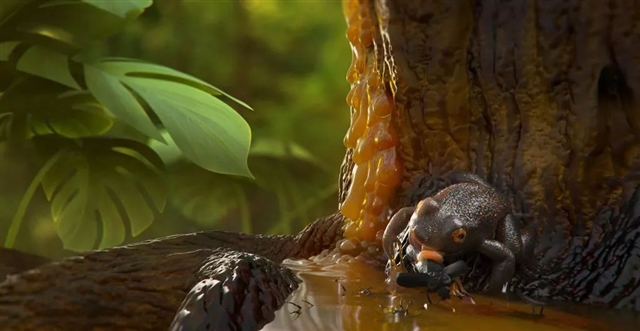|
|
|
|
|
中国地质大学(北京)邢立达团队这次又在琥珀里发现了啥? |
|
|
论文标题:The earliest direct evidence of frogs in wet tropical forests from Cretaceous Burmese amber
期刊:Scientific Reports
作者:Lida Xing, Edward L. Stanley, Ming Bai & David C. Blackburn
发表时间:2018/06/14
数字识别码: 10.1038/s41598-018-26848-w
原文链接:https://www.nature.com/articles/s41598-018-26848-w?utm_source=Other_website&utm_medium=Website_links&utm_content=RenLi-Nature-Scientific_Reports-Animal_Sciences-China&utm_campaign=SCIREP_USG_rlp8212_amber_sciencenet_article_June_3rd

根据《科学报告》发表的一项研究The earliest direct evidence of frogs in wet tropical forests from Cretaceous Burmese amber,在缅甸发现的四个小型蛙类化石带来了无尾目动物(包括蛙类和蟾蜍)在潮湿的热带森林中生活的最早的直接证据。

图1:四个蛙类化石标本Electrorana。
Xing et al.
蛙类大约起源于2亿年前,但是这些早期两栖动物的化石记录相对较少。今天,许多不同种类的蛙类栖息在世界各地的热带森林中。它们可能起源于古近纪——大约6600万-2300万年前。然而,很少有直接证据表明蛙类最初是从何时开始生活在热带栖息地的。

图2:微型CT扫描下的Electrorana limoae正模标本视觉图。:
Xing et al.
中国地质大学(北京)的邢立达及其同事描述了来自白垩纪中期(大约9900万年前)的四个蛙类化石标本——Electrorana limoae,它们被保存在缅甸克钦邦的琥珀中,提供了白垩纪所存在的森林生态系统的记录。作者提供了详细的三维解剖结果——这是这一时期的蟾蜍和蛙类通常所缺乏的。与蛙类保存在一起的还有植物、蜘蛛、昆虫和海洋软体动物。该研究提供的证据表明,蛙类曾生活在潮湿温暖且至少包含一些淡水栖息地的热带森林生态系统中。

图3:生活在缅甸白垩纪时期的蛙类艺术重建图。
Damir G Martin
作者还将化石与现存物种的CT扫描图像以及文献中对已灭绝的蛙类物种的描述进行了比较。他们观察到Electrorana和如今生活在温带地区的某些物种之间存在身体特征上的相似性,这表明如今蛙类的祖先可能曾占据过更为多样化的栖息地。
摘要:Frogs are a familiar and diverse component of tropical forests around the world. Yet there is little direct evidence from the fossil record for the antiquity of this association. We describe four fossil frog specimens from mid-Cretaceous (~99 mya) amber deposits from Kachin State, Myanmar for which the associated fauna provides rich paleoenvironmental context. Microcomputed tomographic analysis provides detailed three-dimensional anatomy for these small frogs, which is generally unavailable for articulated anurans in the Mesozoic. These crown-group anuran specimens provide the earliest direct evidence for anurans in a wet tropical forest. Based on a distinct combination of skeletal characters, at least one specimen has clear similarities to living alytoid frogs as well as several Mesozoic taxa known from the Jehol Biota in China. Whereas many Mesozoic frogs are from seasonal and mesic paleoenvironments, these fossils provide the earliest direct evidence of anurans in wet tropical forests.
阅读论文全文请访问:https://www.nature.com/articles/s41598-018-26848-w?utm_source=Other_website&utm_medium=Website_links&utm_content=RenLi-Nature-Scientific_Reports-Animal_Sciences-China&utm_campaign=SCIREP_USG_rlp8212_amber_sciencenet_article_June_3rd
期刊介绍:Scientific Reports (https://www.nature.com/srep/) is an online, open access journal from the publishers of Nature. We publish scientifically valid primary research from all areas of the natural and clinical sciences.
The 2016 journal metrics for Scientific Reports are as follows:
•2-year impact factor: 4.259
•5-year impact factor: 4.847
•Immediacy index: 0.647(来源:科学网)
特别声明:本文转载仅仅是出于传播信息的需要,并不意味着代表本网站观点或证实其内容的真实性;如其他媒体、网站或个人从本网站转载使用,须保留本网站注明的“来源”,并自负版权等法律责任;作者如果不希望被转载或者联系转载稿费等事宜,请与我们接洽。